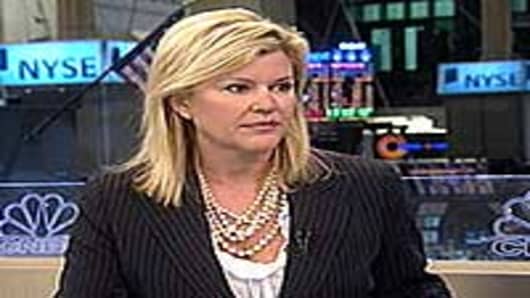A wave of defaults by state and local governments in the coming months will spark a selloff in the municipal bond market, hurting US economic growth and stocks and causing social unrest as governments are forced to lay off workers and cut back on services, well known financial analyst Meredith Whitney told CNBC Tuesday.
Responding to the uproar over her "60 Minutes" interviewbroadcast on CBS Sunday night, Whitney defended her prediction that at least 50 to 100 cities and towns could default on their debt as states and the federal government cut back on financial support.
Muni experts, including an analyst from Standard & Poor's, dismissed her predictions, saying the numbers don't add up.
"I appreciate that the reaction is so violent," she said in a live interview with CNBC. "I didn't put the debt on these states. We're looking at the numbers. This is how it plays out."
The big problem is that cash-strapped states will no longer be able to provide the financial support to municipalities as they have in the past, said Whitney, who is CEO and founder of Meredith Whitney Advisory Group.
"States clearly have been funding municipal governments—for now up to 40 percent of their total expenditures," she explained. "As the states become more compromised from a fiscal standpoint, that funding is going to end."
The federal government is unlikely to bail out the states either, added Whitney, because the cost—which she put at $1 trillion—would cause a political backlash. "Who in Nebraska's going to want to bail out someone in Florida?" she said.
She also sees parallels with the turmoil in Europe over austerity measures imposed there.
"When you have so many different municipalities default ... you going to have so many issues in terms of layoffs of employees," she said. "This is going to be such a wider-spread issue. It's going to look like Europe in terms of programs are cut, you're going to see a lot of social unrest."
Whitney, who became famous for predicting the financial crisis, also said the bigger coastal states are underperforming economically—mostly because of the real estate decline—while the mid-section of the country is doing somewhat better. But she said that's not enough to even out the national economy and have GDP growth of more than 2 percent in the coming months.
Whitney added that it's way too soon to see muni bonds as a buying opportunity. But she said that can change quickly.
"When you start to see the first major defaults in this area [the states and cities], when you see more defaults and indiscriminate selling—if you do your research now and figure out who's protected where and which revenues are protected, there will be great buying opportunities," Whitney said.
"People are complacent about these defaults. The news about all this isn't out there yet," Whitney went on to say. "And only when it is out there, then there will be a buying opportunity [for munis]."


